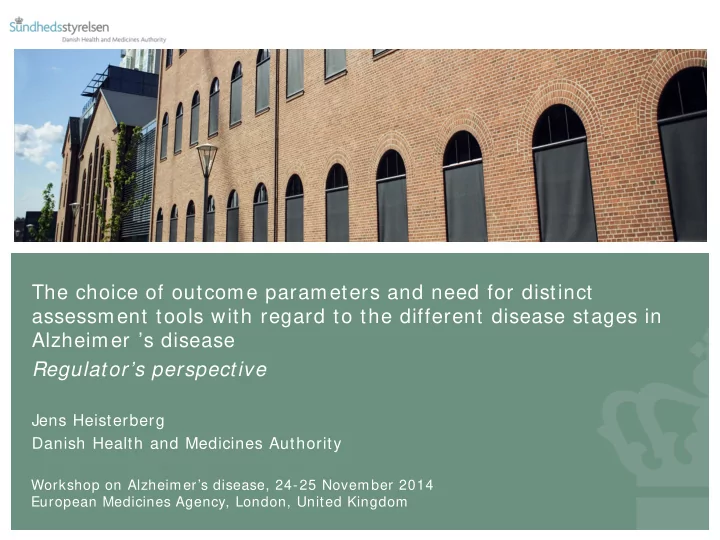

The choice of outcome parameters and need for distinct assessment tools with regard to the different disease stages in Alzheimer ’s disease Regulator’s perspective Jens Heisterberg Danish Health and Medicines Authority Workshop on Alzheimer’s disease, 24-25 November 2014 European Medicines Agency, London, United Kingdom
Conflict of Interests Employee of H. Lundbeck A/ S from 2002 to January 2010 2
Targeting early Alzheimer’s disease Cognitive performance – although core to the disease – has traditionally been regarded by regulators to be insufficient as a measure to obtain marketing authorisation Concern that seemingly favourable effects on cognitive performance would not translate into a clinically meaningful differences for the patients 3
Targeting early Alzheimer’s disease Hence, a measure of function (ADL) or global performance has been required as co-primary endpoint However, in pre-dementia stages of AD, there is no or only little functional impairment Is the regulatory insistence on function in early AD meaningful? 4
Importance of symptom domains at different stages of AD Pre-clinical Prodrom al Mild Moderate Severe Cognition Cognition Cognition Cognition Cognition Function Function Function Function Function Global Global Global Global Global Behaviour Behaviour Behaviour Behaviour Behaviour 5
Where should the regulatory focus be? Pre-clinical Prodrom al Mild Moderate Severe Cognition Cognition Cognition Cognition Cognition Function Function Function Function Function Behaviour Behaviour Behaviour Behaviour Behaviour 6
What does the discussion paper say? “As functional impairment is usually not measurable in prodromal/ MCI patients, its use as co-primary endpoint in this early stage of the disease is not mandatory” ”It is important to demonstrate that any treatment effect is not entirely driven by cognition or function alone” 7
Proposed assessment tools in early AD ”Enriched” ADAS (ADAS-Cog-Plus) Neuropsychological Test Battery for Use in Alzheimer’s Disease (NTB) Clinical Dementia Rating scale Sum of Boxes (CDR-SB) Alzheimer’s Disease Cooperative Study Preclinical Alzheimer Cognitive Composite (ADCS-PACC) 8
Validity of scales in early AD ”For the new instruments, data are needed to provide empirical support for the construct validity and reliability of the new measurement tools (e.g. test-retest, inter-rater, internal consistency, etc)” “… validation of these tests in normal controls and different disease states including influences by age, gender, level of education, time interval of testing etc. is necessary” “Otherwise the clinical meaningfulness is not assessable” 9
Clinical meaningfulness Is ”clinical meaningfulness” meaningful in early AD? Let’s consider a hypothetical application 10
Case A company submits an application for a biological medicine targeting AD pathology Large 24-m placebo-controlled pivotal study included patients with prodromal and mild AD Study showed effect on primary endpoint which was a composite of cognitive measures Composite addressed cognitive domains known to be affected in early stages of AD and had been shown to be sensitive to changes in these stages Relationship to functional deterioration unknown 11
Case Effects appeared robust when looking at a number of appropriate sensitivity analyses But there was no effect whatsoever on ADL (including iADL), global function and QoL But no detrimental effect either Relatively benign safety and tolerability profile Studies ongoing with aim of collecting data on function Results expected after four years 12
”Problems” in accepting cognition as sole evidence for efficacy Regulators have an obligation to ensure that the benefit-risk balance is established before authorising a product Relying solely on a cognitive endpoint is likely to increase the uncertainty whether a clinically relevant benefit is present Price Tolerability Safety Efficacy How serious is the disease? Drug-drug interactions Convenience Ethics What is on the market already? Special How efficacious is it? What are the populations safety and tolerability issues? 2 13
”Problems” in accepting cognition as sole evidence for efficacy Could the problem be mitigated by using alternative ways of licensing? Conditional marketing authorisation Accelerated Approval Future ”Adaptive Licensing” procedures Potential issue about fulfilling post-approval commitments Long-term studies aimed at showing effects on function may not be feasible once the product is on the market 14
Conclusion It is not easy For medicines targeting disease pathology in early AD, one should consider to accept cognition as sole evidence of efficacy for authorisation Alternative licensing schemes may be appropriate for early AD and should perhaps be used more aggressively 15
Recommend
More recommend